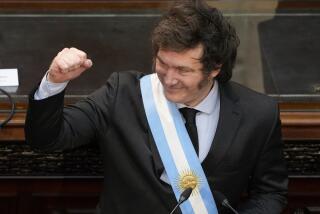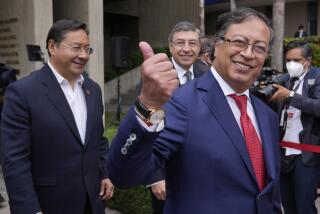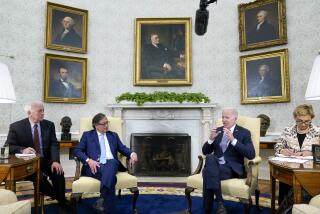Colombia Split Reported Over U.S. Drug Move
BOGOTA, Colombia — An argument apparently is under way in the government over increased U.S. naval activity in the Caribbean against drug traffickers, which President Virgilio Barco Vargas is said to favor.
The United States has said it is increasing air and sea patrols in international waters, and protests came Monday from the opposition Conservatives and leftist Patriotic Union Party in Colombia.
At the same time, a local radio station reported that Foreign Minister Julio Londono Paredes was resigning because he did not have full government backing when he harshly criticized Washington’s move to send the warships as well as its invasion of Panama.
There was no immediate official comment on the resignation report, which said that Londono will meet soon with Barco to discuss the matter.
Confusion over Colombia’s position on the U.S. action resulted from a Sunday statement by Londono that the government rejects any attempt to search Colombian ships. Some international news reports, based on Londono’s comments, interpreted that to mean Barco was angry with the United States.
La Prensa, a Bogota newspaper with access to presidential advisers, said Monday that the problem appears to be within the Colombian government and stems from a dispute between Barco and Londono. Barco has said nothing so far and his office has issued no statements.
A diplomat with the U.S. Embassy said Monday that Barco had not sent a protest note or objected in any other way to the increase of Caribbean patrols. According to La Prensa, the president accepts the U.S. action while Londono never has been pro-American on any international issue.
The falling out began with the U.S. invasion of Panama, La Prensa said. It suggested that Barco supported the invasion and his foreign minister was opposed.
Londono arrived home from a vacation Sunday and said in response to reporters’ questions at the airport: “The Colombian government does not accept, nor will it ever accept, any type of interference with ships carrying the Colombian flag on the high seas.
“Any type of interference on the high seas would need the authorization of the Colombian government, especially of the Ministry of Defense.”
When Barco’s office was asked if that was the official Colombian position and whether Barco was upset about not being told in advance that a U.S. task force would sail into the Caribbean, spokesman Julio Carlos Gonzalez said that Barco had no official comment.
Adding to the confusion about Colombia’s official position was a report Sunday by the Bogota newspaper El Tiempo that Barco’s office had issued a statement saying that Colombia would not contribute warships to the U.S. effort in the Caribbean.
Gonzalez, the Barco spokesman, said that El Tiempo’s story was not based on any Barco statement because none had been issued.
More to Read
Sign up for Essential California
The most important California stories and recommendations in your inbox every morning.
You may occasionally receive promotional content from the Los Angeles Times.










